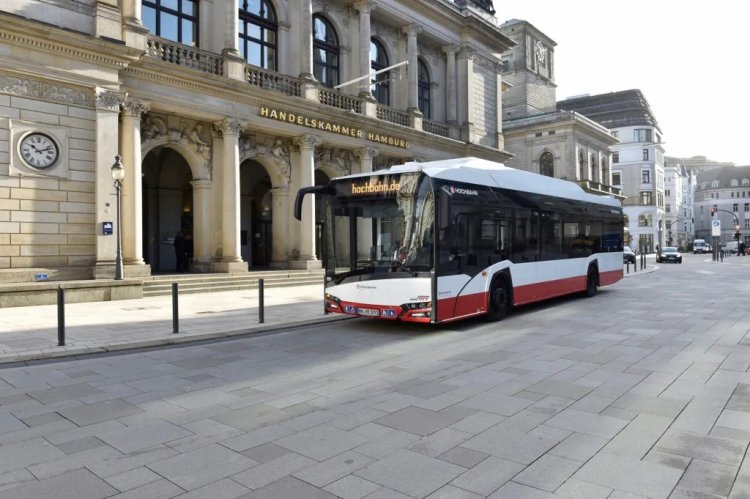Siemens supports expansion of e-bus charging infrastructure in Germany
Complementing this is the use of an energy-efficient ventilation approach that separates the warm and cold air volumes in air ducting, which greatly increases energy savings while charging.

Munich, Germany- Siemens AG., has received two major orders to set up the charging infrastructure for electric buses (e-buses) in two cities in Germany. Siemens will once more assist Hamburger Hochbahn AG, one of Germany's leading public transportation firms, in achieving its objective of running an entirely emission-free bus fleet by 2030. Kreisverkehrsbetriebe Saarlouis (KVS GmbH) will be able to switch over smoothly to electric buses in Saarlouis thanks to Siemens. The projects entail designing, constructing, and integrating the charging infrastructure with the medium-voltage grid. Multi-year maintenance contracts are added to this. Eliminating all diesel-powered buses in Hamburg alone would reduce CO2 emissions by almost 66,000 tons annually.
Markus Mildner, CEO of eMobility at Siemens Smart Infrastructure said, “Electromobility is one of the most important levers for reducing greenhouse gas emissions. We are pleased to provide state-of-the-art charging technology and efficient software solutions to make this transition easy and economically attractive for bus fleet operators.”
According to the German Federal Environment Agency, the transport sector accounted for 19.4 percent of total greenhouse gas emissions in Germany in 2021. In the amendment to the Climate Protection Act, the German government reaffirms its goal to make Germany greenhouse gas neutral by 2045. Against this backdrop, the transformation of local public transport in favor of climate-friendly systems is gaining significant momentum.
Hamburger Hochbahn AG, transports more than 1.2 million people daily on 119 bus lines and four subway lines.
In accordance with a decision passed by the Hamburg Senate, Hamburger Hochbahn AG has only purchased electric buses since 2020 and plans to operate an entirely emission-free bus fleet by 2030. Siemens successfully installed 141 SICHARGE UC charging stations as well as medium- and low-voltage equipment, including SIVACON S8 low-voltage switchgear, in two carports at the Alsterdorf bus depot between 2021 and 2023. Complementing this is the use of an energy-efficient ventilation approach that separates the warm and cold air volumes in air ducting, which greatly increases energy savings while charging.
Hamburger Hochbahn AG gave Siemens an order in March 2023 to set up the Harburg II bus depot for DC charging of its expanding fleet of e-buses. 20 SICHARGE UC charging points of the most recent generation, each with a nominal power of 150 kW, will be erected on five lanes in order to achieve this. Based on the planning requirements provided by the customer, Siemens will develop a working and implementation plan. The chargers will be installed outside on a truss system that spans the bus lanes using industry-standard CCS connectors. A transformer station for integration into the medium-voltage grid as well as the requisite communications technologies for integration into the charging and depot management system are also included in the project's scope.
The necessary accessibility of the charging infrastructure is guaranteed by a five-year maintenance and service contract. The depot's expansion and conversion will take place while it is still in use. The planned commissioning date is early 2024.
Siemens is also collaborating with Hamburger Hochbahn AG to put advanced requirements into practice to manage the network and charging infrastructure for the depots. Additionally, there are already plans in place to provide long-term bidirectional power flows.
At the moment, Hamburger Hochbahn AG operates more than 250 battery-electric buses, including articulated buses with a minimum range of about 250 kilometers without stopping for charge and a length of 18 meters, space for more than 130 passengers, and.
New project in Saarlouis
Siemens will make it possible for Kreisverkehrsbetriebe Saarlouis (KVS GmbH) to make the smooth switch to electric buses in the western German city of Saarlouis. This calls for gradually converting KVS GmbH's bus depot. Siemens will set up the charging system for 20 vehicles in the initial phase. 20 SICHARGE UC charging points of the newest generation, each with a nominal power of 150kW, as well as 20 dispensers, will be erected for this purpose. A 12 kV grid transfer station, 12 kV medium-voltage distribution equipment, transformer stations, and low-voltage distribution equipment will be used to connect the charging infrastructure to the electrical grid infrastructure. Delivery, installation, commissioning, and any necessary civil engineering work will be handled by Siemens. A five-year maintenance contract is included to supplement this.
By the spring of 2024, the first conversion phase should be finished. It will give the option of expanding to 70 buses in a subsequent phase. The Saarlouis district, a transport region with a population of about 200,000, is included in KVS GmbH's service area. Other lines connect with nearby towns and neighborhoods and, in some instances, cross the border into France.


